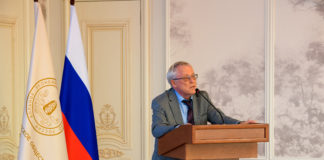Dear readers!
While the magazine was on vacation, certain changes, if not revolutionary, then, without exaggeration, cardinal, have taken place in our economic policy. Finally, the limelight focused on what we at the Free Economic Society had been drawing attention to for many years and what had become impossible for the government designers of economic models to ignore when considering plans for economic development after the last year’s strong «indication» given by the Davos visionaries — digital economy. It was the president who called it a priority that will help overcome our technological — and overall economic — weakness. And then, in an instant, analysts and practitioners, governors and mayors started talking not just about the new task, which emerged unexpectedly as if from the magician’s hat, but also… about their success in accomplishing that task! In connection with “digitalization” many people immediately recalled and made references to the “electrification of the entire country”, “collectivization”, “modernization of the economy” and many other “… ations”, some with a positive effect, but mostly denoting noisy campaigns which had gradually sunk into oblivion once the new campaigns surfaced.
Jokes are jokes, but in fact, the important thing is that all the drafts of development programs submitted to the president, including the competing ones prepared by Alexei Kudrin and Boris Titov, named the problem of overcoming the technological gap as a priority. And, notably, within the framework of the promising technological structure of the world economy, this task can be accomplished exactly by way of “digitizing” the entire technological infrastructure that forms the basis of the new industrial economy of the future. So, the drafts included at least one important aspect of the FES expert reports (we discussed the problem of digitalization of economic processes and management procedures within the Eurasian Economic Union at one of the FES scientific conferences last year and sent recommendations to concerned government bodies and think tanks).
The world will move on to the new technological order within the next decade, and its most important feature — constant technological change — will become an integral part of the production process. Hence the new requirements for the integration of production, science and education. Ahead lie a different economy and a different life, new tasks and new opportunities, in every sphere. There are colossal, fundamental shifts in technologies, materials, processing methods, methods of organizing production and management. A simple example: the tablet, on which I am now writing this editor’s letter, replaces the computer, the database, the post office, the TV set, the clock, and the store… Behind this is a huge amount of job cuts in a number of industries, large quantities of ore, metal, energy savings. In terms of a country, it is a huge deduction from the GDP. At the same time, anyone can now prepare such a text, find the necessary information, and send it to the addressee without so much as getting up from the table and dozens of times faster, easier and better than a couple of decades ago. And this is true for all aspects of people’s lives.
That is, the GDP has declined due to this tablet, which replaces a bunch of devices and productions, while the quality of meeting people’s needs and the quality of life have grown as a result of its use. So should we continue to treat quantitative characteristics — for example, growth or decline in the GDP — as a fetish? Does it make sense to always pursue the percentage, or should we evaluate different parameters: the ability to get the necessary knowledge, medicines, healthcare, etc.? That is, the quality of the economy. The quality of economic development. The quality of meeting people’s needs, those of every individual and of the society as a whole. The quality of life. And can this «harmony» of the social and economic sphere be «verified» by “dry figures” of the economic parameters which are traditionally used? Or is it more important to understand and evaluate the qualitative side of economic and social change?
It seems to me that these questions are becoming increasingly rhetorical. And it was not by chance that I used the tablet example, a concentrated technological expression of the arrival of the new technological order and, if you will, the new — «digitized»! — economy.
The transition to the new technological order within the framework of the next technological revolution will change the qualitative aspect of the economy.
And the fact that it has already been recognized “on high» and become indisputable is a big step forward. And it is already clear to everyone that it is necessary to make up for that which was missed. To choose priorities. To find sources of funding. To take up the reorganization of institutions, the education system, etc. And our chances to accomplish this, despite the current situation, are still there. We still have time to jump on board the train of the new economy that is gaining momentum.
Many businessmen have been investing in the sectors in which serious breakthroughs can be expected in 10-15 years. In my opinion, with the participation of the Russian Academy of Sciences the state should clearly prioritize these sectors and support the private investors who have invested in them because they will form the basis of the new economy.
And the choice of digital economy is a good start.
Sergey Bodrunov
Editor-in-chief
The Free Economy Journal



